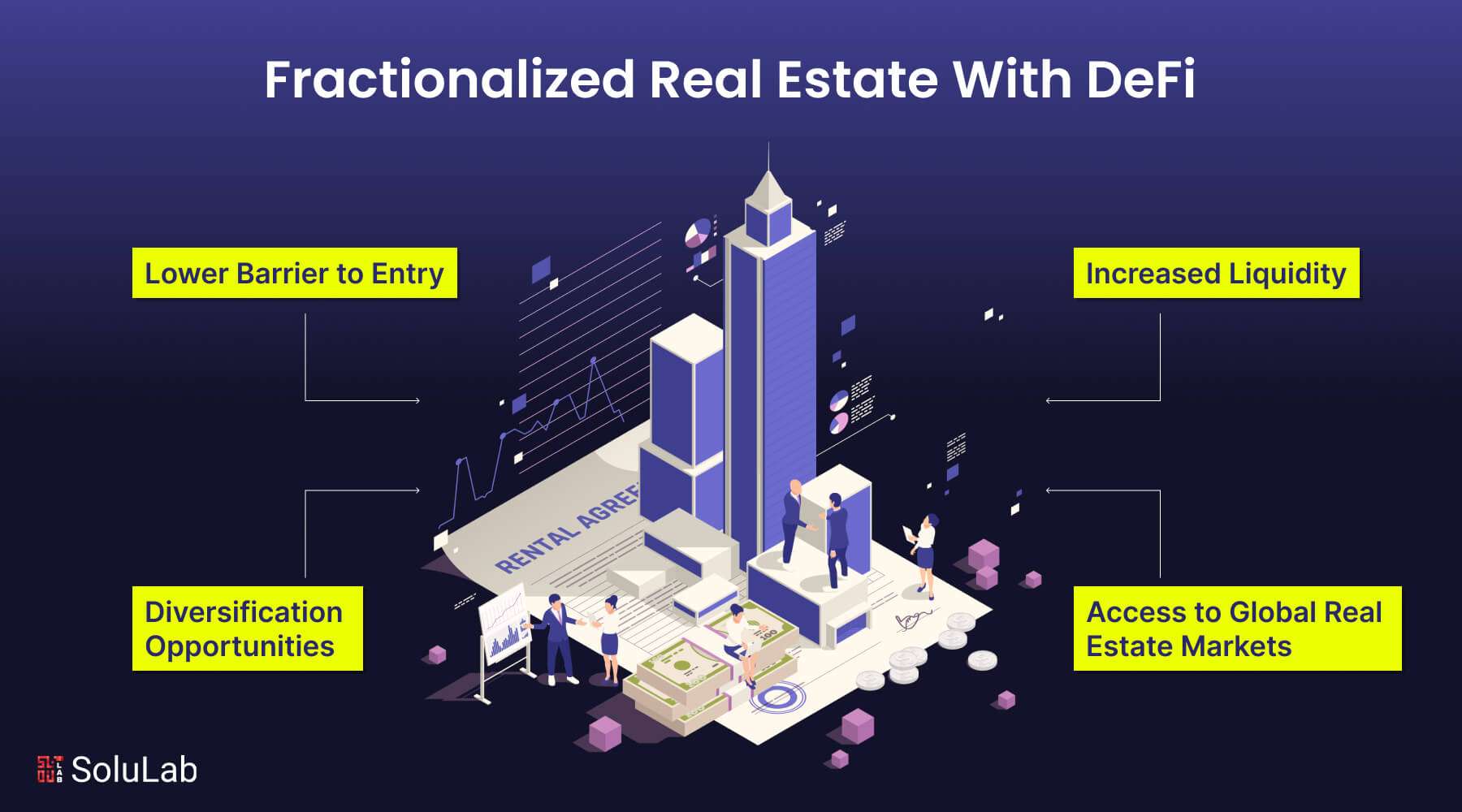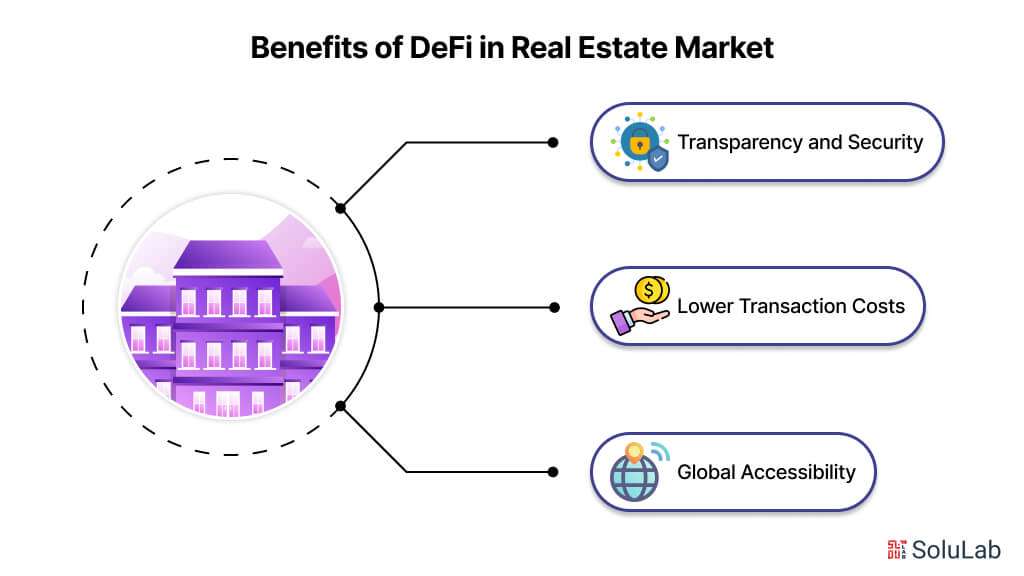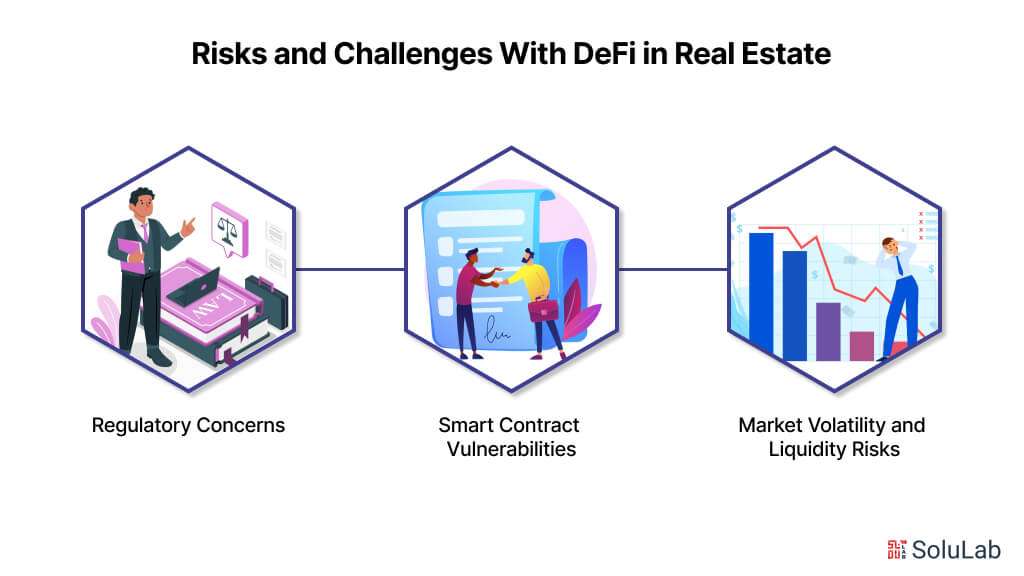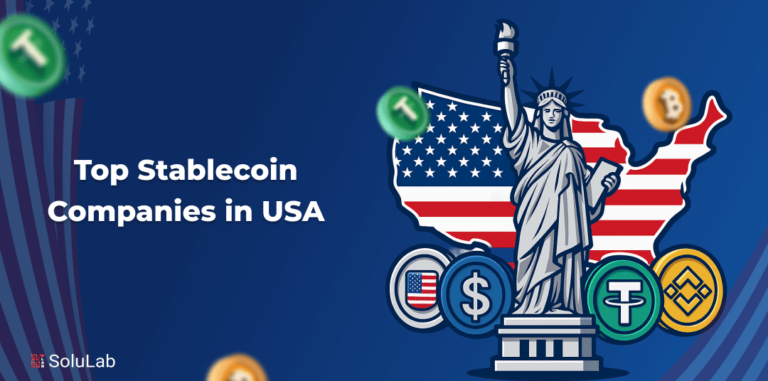
In recent years, the intersection of traditional finance and decentralized technology has given rise to a groundbreaking concept: Fractionalized Real Estate in Decentralized Finance (DeFi). This innovative approach of DeFi in real estate represents a significant departure from conventional methods, offering unprecedented opportunities for investors of all sizes to participate in the lucrative real estate market.
Fractionalized real estate involves the division of property ownership into smaller, more affordable units, allowing multiple investors to collectively own and benefit from the asset. Meanwhile, DeFi leverages blockchain technology and smart contracts to create financial instruments and services that operate without intermediaries, offering efficiency, transparency, and accessibility.
In this blog, we will explore the transformative potential of fractionalized real estate in DeFi, delving into its fundamental principles, benefits, and implications for both investors and the broader real estate industry.
What is Fractionalized Real Estate?
Fractionalized Real Estate transforms the traditional model of property ownership by dividing assets into smaller, more affordable shares, known as fractions. Each fraction represents a proportionate stake in the underlying property, allowing investors to participate in real estate markets with reduced capital requirements. This fractionalization process democratizes access to real estate investments, opening doors for individuals who may have previously been unable to afford full property ownership. Moreover, fractionalized ownership enables investors to diversify their portfolios by spreading their capital across multiple properties, mitigating risk and enhancing potential returns.
Fractionalized Real Estate platforms facilitate the fractionalization process, providing investors with digital tokens representing their ownership stakes. These tokens are typically issued on blockchain networks, ensuring transparency, security, and immutability of ownership records. Through these platforms, investors can browse and select properties, purchase fractions, and manage their portfolios with ease. Fractionalized Real Estate not only revolutionizes the way people invest in real estate but also fosters a more inclusive and accessible investment landscape, where individuals of varying financial backgrounds can participate in the wealth-building potential of real estate markets.
Overview of DeFi
Decentralized Finance (DeFi) offers an alternative to traditional banking and financial services through blockchain-based protocols and smart contracts. DeFi platforms enable users to access a wide array of financial products and services, including lending, borrowing, trading, and asset management, without relying on intermediaries. By leveraging decentralized networks, DeFi eliminates the need for centralized authorities, reducing costs, improving efficiency, and enhancing financial inclusion. Furthermore, DeFi real estate tokenization protocols are open-source and permissionless, allowing developers to build interoperable applications and innovate rapidly, driving the evolution of the decentralized finance ecosystem.
Smart contracts, the cornerstone of DeFi, are self-executing contracts with predefined conditions encoded on blockchain networks. These programmable contracts automate the execution of transactions, enforce agreements, and ensure trustless interactions between parties. Through smart contracts, DeFi platforms enable secure and transparent financial transactions, eliminating the need for traditional intermediaries such as banks and brokers. Moreover, DeFi protocols prioritize user control and ownership of assets, empowering individuals to maintain custody of their funds and participate directly in the global financial marketplace.
How Fractionalization Works?
Fractionalization in real estate involves dividing ownership of a property into smaller, more affordable units or fractions. This process typically occurs through the creation of digital tokens, each representing a fraction of the property’s value. These tokens are issued on blockchain networks, enabling investors to purchase shares of the property without the need for significant capital investment. Fractionalization allows multiple investors to collectively own and benefit from the appreciation and income generated by the underlying asset. Smart contracts govern the issuance, transfer, and redemption of these tokens, ensuring transparency, security, and efficiency in the fractionalized real estate market.
Working Model of the DeFi Lending and Borrowing Platform
There is no yield while storing cryptocurrency in wallets; here is where the DeFi Loans come in handy.
- By putting their coins into Smart Contracts Development, users may use DeFi lending services to lend their assets to others.
- As collateral, the borrowers have to put down cryptocurrency assets that are either worth more than the loan amount or at least the same amount.
- In exchange, the lenders will receive the recently created native tokens of the system.
- With lending pools, users can provide assets to borrowers by using smart contracts.
- Before choosing a loan to borrow, it is essential to do some research to determine the interest type because each lending pool has a different strategy to borrowing; this also holds true for the lender.
- Borrowers may apply for loans straight from the DeFi platform thanks to peer-to-peer lending.
- By providing the assets to others, these loans enable the lenders to earn interest.
Key Advantages for Investors in Real Estate
Here are a few of the key advantages for investors in real estate.
1. Lower Barrier to Entry: Fractionalized real estate in DeFi significantly lowers the barrier to entry for investors, enabling individuals to access high-value real estate assets with minimal capital requirements. By purchasing fractions of properties, investors can participate in real estate markets without the need for substantial upfront investments, democratizing access to lucrative investment opportunities.
2. Increased Liquidity: Fractionalization enhances liquidity in real estate markets by allowing investors to buy, sell, and trade fractions of properties more easily. Unlike traditional real estate investments, which may require lengthy sales processes and significant transaction costs, fractionalized real estate assets can be traded on decentralized exchanges (DEXs) 24/7, providing investors with greater flexibility and liquidity.
3. Diversification Opportunities: Fractionalized Real Estate enables investors to diversify their portfolios by spreading their capital across multiple properties and asset types. By investing in fractions of different properties, investors can mitigate risk and enhance returns by diversifying across geographic locations, property types, and market segments, reducing their exposure to any single asset or market downturn.
4. Access to Global Real Estate Markets: Fractionalized real estate in DeFi offers investors access to a wide range of global real estate markets, transcending geographical barriers and traditional investment constraints. Through decentralized platforms, investors can browse and invest in properties located in various jurisdictions, allowing them to capitalize on emerging market opportunities and diversify their real estate holdings geographically. Additionally, fractionalization enables investors to access premium properties in desirable locations that may have been previously inaccessible due to high capital requirements or regulatory restrictions.
DeFi and Its Role in Fractionalized Real Estate
DeFi protocols represent the underlying infrastructure that enables the seamless integration of Fractionalized Real Estate into the decentralized finance ecosystem. These protocols, predominantly built on blockchain networks like Ethereum, utilize a combination of smart contracts and decentralized applications (DApps) to facilitate the tokenization, trading, and management of real estate assets.
Key DeFi protocols include lending platforms like Compound and Aave, decentralized exchanges (DEXs) such as Uniswap and SushiSwap, and asset management protocols like Yearn Finance. Each protocol serves a specific function within the DeFi ecosystem, collectively providing users with access to a diverse range of financial services and products.
Tokenization of Real Estate Assets
DeFi Real Estate Tokenization involves the digitization of real estate assets, transforming them into fungible or non-fungible tokens (NFTs) on blockchain networks. These tokens represent fractional ownership rights in the underlying properties, allowing investors to buy, sell, and trade shares of real estate assets with unprecedented ease and efficiency.
Tokenization unlocks liquidity by fractionalizing traditionally illiquid assets, enabling investors to diversify their portfolios and access new investment opportunities. Moreover, DeFi in the real estate market offers programmability and interoperability, allowing seamless integration with other DeFi protocols and financial instruments, enhancing liquidity and utility.
Smart Contracts and Automation
Smart contracts serve as the backbone of fractionalized real estate in DeFi, automating key processes and ensuring the seamless execution of transactions. These self-executing contracts are encoded with predefined rules and conditions, which are automatically enforced upon the occurrence of specified events.
In the context of Fractionalized Real Estate, smart contracts govern various aspects of property ownership, including the issuance, transfer, and redemption of digital tokens representing fractional ownership rights. Automation streamlines processes reduces administrative overhead, and eliminates the need for intermediaries, resulting in faster, more secure, and cost-effective real estate transactions.
Benefits of DeFi in Real Estate Market

Here are a few of the benefits of DeFi in real estate transactions:
1. Transparency and Security: DeFi real estate tokenization offers transparent ownership records and immutable transaction histories, ensuring trust and security for investors. Blockchain technology provides a verifiable and tamper-proof record of ownership rights, reducing the risk of fraud, corruption, and dispute. Additionally, decentralized governance mechanisms ensure that ownership rights are protected and enforced autonomously, without the need for centralized intermediaries.
2. Lower Transaction Costs: By eliminating intermediaries and automating processes through smart contracts, DeFi significantly reduces transaction costs associated with traditional real estate investments. Lower fees make Fractionalized Real Estate more accessible to a wider range of investors, democratizing access to lucrative investment opportunities and enhancing market efficiency.
3. Global Accessibility: Fractionalized real estate in DeFi transcends geographical barriers, enabling investors from around the world to participate in real estate markets without restrictions. DeFi protocols operate 24/7, providing seamless access to fractionalized real estate assets across different time zones and jurisdictions, fostering greater liquidity, and market efficiency. Moreover, decentralized exchanges (DEXs) facilitate peer-to-peer trading of real estate tokens, enabling investors to transact directly without the need for intermediaries, further enhancing accessibility and liquidity.
Risks and Challenges With DeFi in Real Estate

While fractionalized real estate in DeFi offers promising opportunities, it also comes with its fair share of risks and challenges. Below, we’ll delve into some of the key risks and challenges associated with DeFi real estate tokenization:
1. Regulatory Concerns
Regulatory uncertainty poses a significant challenge to fractionalized real estate in DeFi, as the intersection of real estate and decentralized finance often falls into regulatory gray areas. Regulatory bodies worldwide are still grappling with how to classify and regulate digital assets, including real estate tokens, leading to ambiguity and potential legal risks for investors and platforms alike.
Regulatory concerns may arise regarding securities laws, anti-money laundering (AML) regulations, investor protection, and tax implications, creating compliance challenges for fractionalized real estate platforms and participants. Moreover, regulatory changes or crackdowns could impact the legality and viability of fractionalized real estate offerings, leading to market uncertainty and investor apprehension.
2. Smart Contract Vulnerabilities
While smart contracts offer numerous benefits, including automation and transparency, they are not immune to vulnerabilities and exploitation. Smart contract bugs, coding errors, and vulnerabilities could expose Fractionalized Real Estate tokenization platforms and investors to security risks, including hacking, theft, and loss of funds.
Even minor flaws in smart contract code could be exploited by malicious actors to manipulate transactions, drain funds, or compromise the integrity of the platform. Furthermore, the irreversible nature of blockchain transactions means that any funds lost due to smart contract vulnerabilities may be irrecoverable, amplifying the financial and reputational risks associated with such incidents.
3. Market Volatility and Liquidity Risks
Market volatility and liquidity risks are inherent to real estate investments, and fractionalized real estate in DeFi is no exception. Fluctuations in real estate markets, driven by economic conditions, geopolitical events, and investor sentiment, can impact the value of fractionalized real estate assets and the liquidity of trading markets. Illiquid markets may hinder investors’ ability to buy or sell real estate tokens at desired prices, leading to price slippage and reduced trading volumes.
Moreover, during periods of market stress or uncertainty, liquidity may dry up entirely, exacerbating price volatility and increasing the risk of significant losses for investors. Additionally, regulatory changes or restrictions could affect the liquidity and tradability of real estate tokens, further amplifying liquidity risks in fractionalized real estate markets.
Future Outlook of DeFi for Fractionalized Real Estate
The growth potential of fractionalized real estate in DeFi is immense, driven by several factors including increasing investor demand for alternative investment opportunities, advancements in blockchain technology, and regulatory clarity.
As DeFi continues to gain mainstream acceptance and adoption, more investors are likely to explore Fractionalized Real Estate as a viable option for diversifying their portfolios and accessing previously inaccessible real estate markets. Additionally, the lower barrier to entry, enhanced liquidity, and transparency offered by DeFi platforms are expected to attract a broader range of investors, including retail and institutional players.
Furthermore, as blockchain technology matures and scalability solutions are implemented, the efficiency and cost-effectiveness of fractionalized real estate in DeFi are likely to improve significantly. This could lead to a proliferation of new platforms and projects catering to different market segments and asset classes, further fueling growth and innovation in the space. Moreover, as regulatory frameworks evolve to accommodate digital assets and decentralized finance, regulatory clarity and certainty are expected to increase, providing a conducive environment for the expansion of DeFi for fractionalized real estate.
Potential Innovations and Developments for DeFi in Real Estate
The future of fractionalized real estate in DeFi holds promise for various innovations and developments that could revolutionize the way real estate investments are conducted. One potential area of innovation is the integration of decentralized identity solutions, such as decentralized identifiers (DIDs) and verifiable credentials, to enhance identity verification and compliance processes. This could streamline onboarding procedures for investors while ensuring regulatory compliance and data privacy.
Additionally, advancements in tokenization standards and interoperability protocols could enable seamless trading and transfer of real estate tokens across different blockchain networks and platforms. This interoperability could foster greater liquidity and accessibility in Fractionalized Real Estate markets, allowing investors to tap into a global pool of real estate assets effortlessly.
Furthermore, the emergence of decentralized autonomous organizations (DAOs) could democratize decision-making processes in Fractionalized Real Estate projects, enabling investors to participate in governance and management activities directly. DAOs could facilitate transparent and decentralized decision-making, enhancing investor confidence and trust in DeFi real estate tokenization projects.
Concluding Remarks
In conclusion, the union of Fractionalized Real Estate with DeFi represents a remarkable evolution in the way we perceive and engage with real estate investment. Through the fractionalization of property ownership and the utilization of decentralized finance protocols, investors are empowered with unprecedented access to global real estate markets, enhanced liquidity, and diversification opportunities. DeFi lending and borrowing platforms, along with tokenization of real estate assets, offer innovative solutions to traditional barriers, enabling individuals to participate in real estate investment with greater flexibility and efficiency. This convergence of real-world assets in DeFi not only democratizes access to real estate markets but also paves the way for a more inclusive and dynamic financial ecosystem
At SoluLab, we understand the complexities of DeFi development and as a leading DeFi development company, we offer expertise in blockchain technology, smart contract development, and decentralized application (DApp) development. Whether you’re looking to build a DeFi lending platform, tokenize real estate assets, or explore innovative solutions in the DeFi space, our team of experienced dedicated developers is here to assist you every step of the way. Contact us today to learn more about how SoluLab can help you utilize the power of DeFi for your business goals.
FAQs
1. What is the fractionalized real estate in DeFi?
Fractionalized real estate in DeFi refers to the process of dividing ownership of real estate assets into smaller, more affordable units using decentralized finance protocols. Through tokenization, investors can purchase fractions of real estate properties, gaining exposure to the real estate market without the need for significant capital investment.
2. How do DeFi lending platforms work for fractionalized real estate?
DeFi lending platforms allow users to lend their crypto assets to borrowers in exchange for interest. In the context of Fractionalized real estate, lenders deposit their assets into smart contracts, which are then lent out to borrowers who provide crypto assets as collateral. Lenders earn interest on their deposited assets, while borrowers gain access to liquidity by borrowing against their collateral.
3. What are the benefits of fractionalized real estate in DeFi?
Fractionalized real estate in DeFi offers several benefits, including increased accessibility to real estate markets, enhanced liquidity, and diversification opportunities. Investors can participate in real estate investment with lower capital requirements while enjoying the flexibility of trading fractions of properties on decentralized platforms.
4. What are the risks associated with fractionalized real estate in DeFi?
Risks include regulatory uncertainties, smart contract vulnerabilities, and market volatility. Regulatory concerns may arise due to evolving regulations surrounding digital assets, while smart contract vulnerabilities could expose participants to security risks. Additionally, market fluctuations may impact the value of real estate tokens and the liquidity of trading markets.
5. How can I get started with fractionalized real estate in DeFi?
To get started, research and choose a reputable DeFi platforms that offers Fractionalized Real Estate services. Familiarize yourself with the platform’s lending and borrowing mechanisms, as well as its risk management protocols. Ensure that you understand the terms and conditions of participation, including interest rates, collateral requirements, and potential risks involved. Finally, start with a small investment to test the waters before committing larger amounts.





